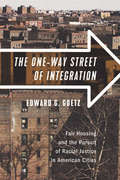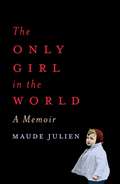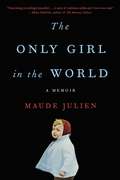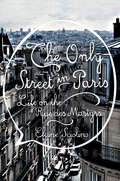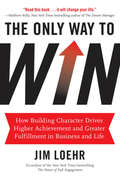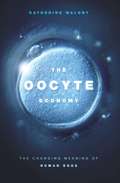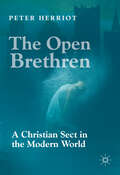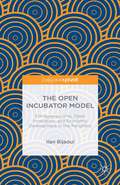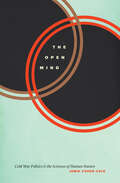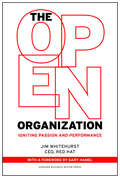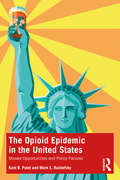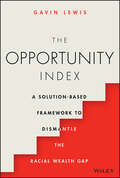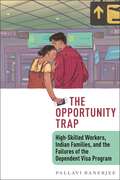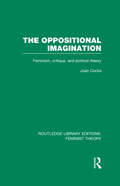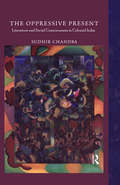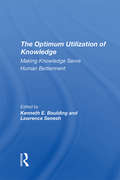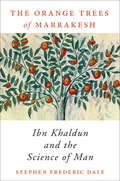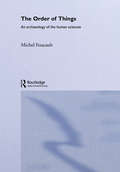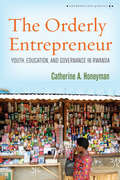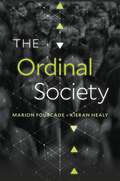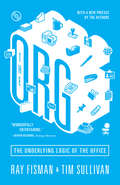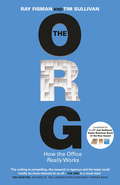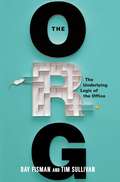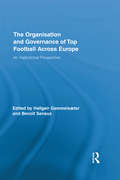- Table View
- List View
The One-Way Street of Integration: Fair Housing and the Pursuit of Racial Justice in American Cities
by Edward G. GoetzThe One-Way Street of Integration examines two contrasting housing policy approaches to achieving racial justice. Integration initiatives and community development efforts have been for decades contrasting means of achieving racial equity through housing policy. Goetz traces the tensions involved in housing integration and policy to show why he doesn't see the solution to racial injustice as the government moving poor and nonwhite people out of their communities. The One-Way Street of Integration critiques fair housing integration policies for targeting settlement patterns while ignoring underlying racism and issues of economic and political power. Goetz challenges liberal orthodoxy, determining that the standard efforts toward integration are unlikely to lead to racial equity or racial justice in American cities. In fact, in this pursuit it is the community development movement rather that has the greatest potential for connecting to social change and social justice efforts.
The Only Girl in the World: A Memoir
by Maude JulienFor readers of Damaged and Running with Scissors, a chilling exploration of psychological control that ends with a glorious escape. Maude still remembers the sound of the gate being locked behind her. She was three years old when they moved into the secluded manor and in the coming years, she would only be allowed out a handful of times. Her parents belonged to a fanatical Masonic order. She followed a strict schedule of study, hard labour and endless drills designed to &‘eliminate weakness&’, such as holding an electric fence without flinching and sitting in a rat-infested cellar. But despite their chilling psychological control, her parents could not control her inner life. Befriending animals on the lonely estate and characters in the books she read, Maude nurtured in herself the compassion and love her parents forbade.
The Only Girl in the World: A Memoir
by Maude JulienAN AMAZON BEST BOOK OF THE MONTH. For readers of Room and The Glass Castle, an astonishing memoir of one woman rising above an unimaginable childhood. Maude Julien's parents were fanatics who believed it was their sacred duty to turn her into the ultimate survivor--raising her in isolation, tyrannizing her childhood and subjecting her to endless drills designed to "eliminate weakness." Maude learned to hold an electric fence for minutes without flinching, and to sit perfectly still in a rat-infested cellar all night long (her mother sewed bells onto her clothes that would give her away if she moved). She endured a life without heat, hot water, adequate food, friendship, or any kind of affectionate treatment.But Maude's parents could not rule her inner life. Befriending the animals on the lonely estate as well as the characters in the novels she read in secret, young Maude nurtured in herself the compassion and love that her parents forbid as weak. And when, after more than a decade, an outsider managed to penetrate her family's paranoid world, Maude seized her opportunity. By turns horrifying and magical, The Only Girl in the World is a story that will grip you from the first page and leave you spellbound, a chilling exploration of psychological control that ends with a glorious escape.
The Only Street in Paris: Life On The Rue Des Martyrs
by Elaine SciolinoA New York Times Bestseller: “Sciolino’s sharply observed account serves as a testament to . . . Paris— the city of light, of literature, of life itself.” —The New Yorker Elaine Sciolino, the former Paris Bureau Chief of the New York Times, invites us on a tour of her favorite Parisian street, offering an homage to street life and the pleasures of Parisian living. “I can never be sad on the rue des Martyrs,” Sciolino explains, as she celebrates the neighborhood’s rich history and vibrant lives. While many cities suffer from the leveling effects of globalization, the rue des Martyrs maintains its distinct allure. On this street, the patron saint of France was beheaded and the Jesuits took their first vows. It was here that Edgar Degas and Pierre-Auguste Renoir painted circus acrobats, Emile Zola situated a lesbian dinner club in his novel Nana, and François Truffaut filmed scenes from The 400 Blows. Sciolino reveals the charms and idiosyncrasies of this street and its longtime residents—the Tunisian greengrocer, the husband-and-wife cheesemongers, the showman who’s been running a transvestite cabaret for more than half a century, the owner of a 100-year-old bookstore, the woman who repairs eighteenth-century mercury barometers—bringing Paris alive in all of its unique majesty. The Only Street in Paris will make readers hungry for Paris, for cheese and wine, and for the kind of street life that is all too quickly disappearing.
The Only Way to Win: How Building Character Drives Higher Achievement and Greater Fulfillment in Business and Life
by Jim LoehrWhy Winning with Character Is the Only Way to WinThe conditioning begins early in our lives. Great achievements will bring lasting happiness and fulfillment; great achievements form the bedrock of stable self-esteem and strong character; great achievements will become the foundation for a successful life. If these well-intentioned promises are true, why does winning never seem to be enough? In The Only Way to Win, Jim Loehr draws upon two decades of work with Fortune 500 executives; world-class athletes such as Monica Seles, Dan Jansen, and Eric Lindros; and other high achievers at the Human Performance Institute (HPI) to reveal surprising insights about achievement motivation. Specifically, Loehr finds that the blind pursuit of external achievement often results in emptiness, addiction, and, ironically, poor performance. It's not really about what you achieve, he argues, it's about who you become as a consequence of the chase. As Loehr powerfully demonstrates, success at work and fulfillment in life require a complete re-purposing of achievement, one where value is derived from growth in areas such as integrity, honesty, gratefulness, humility, optimism, and compassion. To help readers start this process, he provides them with the tools they need to develop these character traits, as well as the plan they need to use them effectively.A compelling, practical, and hopeful read filled with relatable stories and useful exercises, The Only Way to Win will serve as a powerful wake-up call for business leaders, employees, teachers, and coaches. It will also provide inspiration for readers looking to perform better, achieve more, and change both their own lives and those of the people they influence. Jim Loehr is a world-renowned performance psychologist, co-founder of the Human Performance Institute, and author of fifteen books, including his most recent, The Power of Story. He also co-authored the national bestseller The Power of Full Engagement.
The Oocyte Economy: The Changing Meaning of Human Eggs
by Catherine WaldbyIn recent years increasing numbers of women from wealthy countries have turned to egg donation, egg freezing, and in vitro fertilization to become pregnant, especially later in life. This trend has created new ways of using, exchanging, and understanding oocytes—the reproductive cells specific to women. In The Oocyte Economy Catherine Waldby draws on 130 interviews---with scientists, clinicians, and women who have either donated or frozen their oocytes or received those of another woman---to trace how the history of human oocytes' perceived value intersects with the biological and social life of women. Demonstrating how oocytes have come to be understood as discrete and scarce biomedical objects open to valuation, management, and exchange, Waldy examines the global market for oocytes and the power dynamics between recipients and the often younger and poorer donors. With this exploration of the oocyte economy and its contemporary biopolitical significance, Waldby rethinks the relationship between fertility, gendered experience, and biomedical innovation.
The Open Brethren: A Christian Sect in the Modern World
by Peter HerriotThis book gives a personal insight into the hearts and minds of a fundamentalist Christian sect, the Open Brethren. Using Brethren magazine articles, obituaries, and testimonies, Peter Herriot argues that the Brethren constitute a perfect example of a fundamentalism. Their culture is entirely opposed to the beliefs, values, and norms of modernity. As a result, like other fundamentalisms they challenge modern Christianity and impede its efforts to engage with global society.
The Open Incubator Model: Entrepreneurship, Open Innovation, and Economic Development in the Periphery
by Ilan BijaouiThe Open Incubator Model analyzes the different support policies needed in big cities, rural areas and country borders for entrepreneurs in developed and developing countries to generate cooperation and improve the business models of local SMEs.
The Open Mind: Cold War Politics and the Sciences of Human Nature
by Jamie Cohen-ColeThis study chronicles the rise of psychology as a tool for social analysis during the Cold War Era and the concept of the open mind in American culture. In the years following World War II, a scientific vision of the rational, creative, and autonomous self took hold as an essential way of understanding society. In The Open Mind, science historian Jamie Cohen-Cole demonstrates how this notion of the self became a defining feature of Cold War culture. From 1945 to 1965, policy makers used this new concept of human nature to advance a centrist political agenda and instigate nationwide educational reforms that promoted more open, and indeed more human, minds. The new field of cognitive science was central to this project, helping to overthrow the behaviorist view that the mind either did not exist or could not be studied scientifically. While the concept of the open mind initially unified American culture, this unity started to fracture between 1965 and 1975, as the ties between political centrism and the scientific account of human nature began to unravel. During the late 1960s, feminists and the New Left repurposed psychological tools to redefine open-mindedness as a characteristic of left-wing politics. As a result, once-liberal intellectuals became neoconservative, and in the early 1970s, struggles against open-mindedness gave energy and purpose to the right wing.
The Open Organization
by Gary Hamel Jim WhitehurstTODAY'S LEADERS KNOW THAT SPEED and agility are the keys to any company's success, and yet many are frustrated that their organizations can't move fast enough to stay competitive. The typical chain of command is too slow; internal resources are too limited; people are already executing beyond normal expectations. As the pace accelerates, how do you inspire people's energy and creativity? How do you collaborate with customers, vendors, and partners to keep your organization on the cutting edge? What kind of organization matches the speed and complexity that businesses must master-and how do you build that organization?Jim Whitehurst, CEO of Red Hat, one of the world's most revolutionary companies, shows how open principles of management-based on transparency, participation, and community-reinvent the organization for the fast-paced connected era. Whitehurst gives readers an insider's look into how an open and innovative organizational model works. He shows how to leverage it to build community, respond quickly to opportunities, harness resources and talent both inside and outside the organization, and inspire, motivate, and empower people at all levels to act with accountability.The Open Organization is a must-read for leaders struggling to adapt their management practices to the values of the digital and social age. Brimming with Whitehurst's personal stories and candid advice for leading an open organization, as well as with instructive examples from employees and managers at Red Hat and companies such as Google, The Body Shop, and Whole Foods, this book provides the blueprint for reinventing your organization.tools needed to reach a new level of work. And with that new level of work comes unparalleled success.The Open Organization is your new resource for doing business differently. Get ready to make traditional management thinking obsolete.
The Opioid Epidemic in the United States: Missed Opportunities and Policy Failures
by Mark E. Rushefsky Kant B. PatelThe current opioid epidemic in the United States began in the mid-1990s with the introduction of a new drug, OxyContin, viewed as a safer and more effective opiate for chronic pain management. By 2017, the opioid epidemic had become a full-blown crisis as over two million Americans had become dependent on and abused prescription pain pills and street drugs. This book examines the origins, development, and rise of the opioid epidemic in the United States from the perspective of the public policy process. The authors, political scientists Kant Patel and Mark Rushefsky, discuss institutional features of the American political system that impact the making of public policy, arguing that the fragmentation of that system hinders the ability to coherently address policy problems, taking the opioid epidemic as an example. The book begins with a brief historical examination of the history of the problem of opioid addiction and crises in the United States and public policy responses to past crises, but the main focus is on the current national public health emergency. The book analyzes the following: The origins of the current crisis Indicators and warning signs pointing to the emergence of a significant public problem Factors that contributed to the opioid crisis Why the crisis emerged in the United States and not in other Western countries The nature and scope of the opioid crisis, including socioeconomic and demographic characteristics and the human, social, and economic costs Presidential administrations’ public response, and nonresponse, to the opioid crisis Parallels between the role played by opioid manufacturers and tobacco/cigarette manufacturers in creating the problem of addiction, resulting in high mortality rates, and the public policy response to both This book explores the national policy response to the opioid crisis, as well as state and local government responses and separation of powers, including how the three branches of government deal with the opioid problem. The authors conclude with a discussion of how accurate problem definition, problem diagnosis, and appropriate and timely responses could have produced a more appropriate and robust policy response—policy process tools that will be essential in fighting both the current crisis and the next one. The Opioid Epidemic in the United States is essential reading for policy analysis courses in political science, health, and social work programs, as well as for United States policymakers at the local, state, and national levels.
The Opioid Epidemic in the United States: Missed Opportunities and Policy Failures
by Mark E. Rushefsky Kant B. PatelThe current opioid epidemic in the United States began in the mid-1990s with the introduction of a new drug, OxyContin, viewed as a safer and more effective opiate for chronic pain management. By 2017, the opioid epidemic had become a full-blown crisis as over two million Americans had become dependent on and abused prescription pain pills and street drugs.This book examines the origins, development, and rise of the opioid epidemic in the United States from the perspective of the public policy process. The authors, political scientists Kant Patel and Mark Rushefsky, discuss institutional features of the American political system that impact the making of public policy, arguing that the fragmentation of that system hinders the ability to coherently address policy problems, taking the opioid epidemic as an example. The book begins with a brief historical examination of the history of the problem of opioid addiction and crises in the United States and public policy responses to past crises, but the main focus is on the current national public health emergency. The book analyzes the following: The origins of the current crisis Indicators and warning signs pointing to the emergence of a significant public problem Factors that contributed to the opioid crisis Why the crisis emerged in the United States and not in other Western countries The nature and scope of the opioid crisis, including socioeconomic and demographic characteristics and the human, social, and economic costs Presidential administrations’ public response, and nonresponse, to the opioid crisis Parallels between the role played by opioid manufacturers and tobacco/cigarette manufacturers in creating the problem of addiction, resulting in high mortality rates, and the public policy response to both This book explores the national policy response to the opioid crisis, as well as state and local government responses and separation of powers, including how the three branches of government deal with the opioid problem. The authors conclude with a discussion of how accurate problem definition, problem diagnosis, and appropriate and timely responses could have produced a more appropriate and robust policy response—policy process tools that will be essential in fighting both the current crisis and the next one. The Opioid Epidemic in the United States is essential reading for policy analysis courses in political science, health, and social work programs, as well as for United States policymakers at the local, state, and national levels.
The Opportunity Index: A Solution-Based Framework to Dismantle the Racial Wealth Gap
by Gavin LewisA bold and fresh perspective unravelling the economics of racial inequality In The Opportunity Index, BlackRock Managing Director and co-founder of the #Talkaboutblack movement, Gavin Lewis, skillfully plots the origins of the racial wealth gap and its impact on the inequalities faced by the Black community today. Weaving a personal and at times moving narrative through some of the most disruptive events of our time, he offers a blueprint for businesses and individuals to understand the risks and opportunities presented by inequality and issues an urgent call to action. The Opportunity Index also presents: A root cause-oriented and solutions-focused exploration of the racial wealth gap and its role in social, health, and opportunity inequality A perspective that moves beyond the typical workplace discussion to explore the deeper truths about society and the role of capitalism The lessons learned from the #BlackLivesMatter, #MeToo, and climate change movements and how these provide case studies for real and lasting changeAn eye-opening and insightful treatment of what equity and access mean in the context of international finance, The Opportunity Index will earn a place in the libraries of finance professionals, business leaders, teachers, academics, community leaders, diversity, equity, and inclusion experts, and anyone else with an interest in racial, social, and economic fairness around the world.
The Opportunity Trap: High-Skilled Workers, Indian Families, and the Failures of the Dependent Visa Program
by Pallavi BanerjeeWinner, 2024 Global Sociology Book Award, given by the Canadian Sociological Association Winner of the 2024 Silver Medal for the Canada West Non-Fiction category, given by The Independent Publisher Book AwardWinner of the ASA Section on Asia and Asian America's Book Award on Asian AmericaHonorable Mention, 2024 Social Science Category Book Awards, given by the Association for Asian American StudiesHonorable Mention, 2022 Betty and McClung Lee Book Award, given by the Association for Humanist SociologyUnravels how US visa laws fail Indian professional workers and their legally dependent spouses and familiesThe Opportunity Trap is the first book to look at the impact of the H-4 dependent visa programs on women and men visa holders in Indian families in America. Comparing two distinct groups of Indian immigrant families —families of male high-tech workers and female nurses—Pallavi Banerjee reveals how visa policies that are legally gender and race neutral in fact have gendered and racialized ramifications for visa holders and their spouses. Drawing on interviews with fifty-five Indian couples, Banerjee highlights the experiences of high-skilled immigrants as they struggle to cope with visa laws, which forbid their spouses from working paid jobs. She examines how these unfair restrictions destabilize—if not completely dismantle—families, who often break under this marital, financial, and emotional stress. Banerjee shows us, through the eyes of immigrants themselves, how the visa process strips them of their rights, forcing them to depend on their spouses and the government in fundamentally challenging ways. The Opportunity Trap provides a critical look at our visa system, underscoring how it fails immigrant families.
The Oppositional Imagination: Feminism, Critique and Political Theory (Routledge Library Editions: Feminist Theory)
by Joan CocksThe Oppositional Imagination draws together elements from Marxism, analytical philosophy, post-structuralism, and post-colonial criticism to analyse the elusive interplay of culture and power. It focuses its attention on cultural domination, opposition and evasion in the realm of sex and gender. Joan Cocks reflects on questions crucial to both political theorists and feminists: the relationship between political theory and practical life; the possibility of bringing together a philosophical and a literary language to comprehend and evoke concrete experience; and the reconciliation of radical political commitment with an appreciation of shades of grey in the social world. She explores the variety of ways in which power and eroticism intersect; the liberating and tyrannical impulses of marginal cultures; and the place of the loyalist, the eccentric, the critic, the traitor, and the rebel in the sexual struggle. The Oppositional Imagination reaffirms the centrality of political theory and feminist practice while at the same time challenging certain of their key principles in thought-provoking ways.
The Oppressive Present: Literature and Social Consciousness in Colonial India
by Sudhir ChandraMarking a departure from studies on history and literature in colonial India, The Oppressive Present explores the emergence of social consciousness as a result of and in response to the colonial mediation in the late nineteenth century. In focusing on contemporary literature in Hindi, Bengali, Gujarati, and Marathi, it charts an epochal change in the gradual loss of the old pre-colonial self and the configuration of a new, colonized self. It reveals that the ‘oppressive present’ of generations of subjugated Indians remains so for their freed descendants: the consciousness of those colonized generations continues to characterize the ‘modern educated Indian’. The book proposes ambivalence rather than binary categories — such as communalism and nationalism, communalism and secularism, modernity and tradition — as key to understanding the making of this consciousness. This cross-disciplinary volume will prove essential to scholars and students of modern and contemporary Indian history and society, comparative literature and post-colonial studies.
The Optimum Utilization Of Knowledge: Making Knowledge Serve Human Betterment
by Kenneth E. Boulding Lawrence SeneshWe all have more knowledge than we use; even so, say the editors of this book, ignorance often governs our actions. Society continues to find ways to misuse knowledge–from manipulating information to gain political power to restricting what ideas are explored on university campuses. Thus, when some of the best minds in the country met to focus on the optimum utilization of knowledge, it was not an idle academic inquiry. In these proceedings from that conference, which was sponsored by the Academy of Independent Scholars, the contributors examine several of the key aspects of learning: the importance of knowledge in decision making, the role of our educational system and other systems in producing and disseminating knowledge, and the relationship between knowledge and the physiological, psychological, and cultural bases of the learning process. The misuse of knowledge–or the overuse of ignorance–the authors note, could threaten the existence of the entire planet, if the kind of thinking exemplified by the nuclear arms race prevails.
The Orange Trees of Marrakesh: Ibn Khaldun and the Science of Man
by Stephen Frederic DaleAn examination of Khaldun’s Islamic history of the premodern world, its philosophical underpinnings, and the author himself.In his masterwork Muqaddimah, the Arab Muslim Ibn Khaldun (1332–1406), a Tunisian descendant of Andalusian scholars and officials in Seville, developed a method of evaluating historical evidence that allowed him to identify the underlying causes of events. His methodology was derived from Aristotelian notions of nature and causation, and he applied it to create a dialectical model that explained the cyclical rise and fall of North African dynasties. The Muqaddimah represents the world’s first example of structural history and historical sociology. Four centuries before the European Enlightenment, this work anticipated modern historiography and social science.In Stephen F. Dale’s The Orange Trees of Marrakesh, Ibn Khaldun emerges as a cultured urban intellectual and professional religious judge who demanded his fellow Muslim historians abandon their worthless tradition of narrative historiography and instead base their works on a philosophically informed understanding of social organizations. His strikingly modern approach to historical research established him as the premodern world’s preeminent historical scholar. It also demonstrated his membership in an intellectual lineage that begins with Plato, Aristotle, and Galen; continues with the Greco-Muslim philosophers al-Farabi, Avicenna, and Averroes; and is renewed with Montesquieu, Hume, Adam Smith, and Durkheim.Praise for The Orange Trees of Marrakesh“Stephen Dale’s book contains a careful account of the dizzying ups and downs of Ibn Khaldun’s political and academic career at courts in North Africa, Andalusia and Egypt. For these and other reasons The Orange Trees of Marrakesh deserves careful and respectful attention.” —Robert Irwin, The Times Literary Supplement (UK)“Historian Stephen Frederic Dale argues that Ibn Khaldun’s work is a key milestone on the road from Greek to Enlightenment thought, chiming with the radical reasoning of philosophers such as Montesquieu and Adam Smith.” —Barbara Kiser, Nature“Dale’s interest in Greco-Islamic philosophy contributes to this biography’s uniqueness . . . This work provides indispensable background information to truly appreciate this single most influential Islamic historian.” —R. W. Zens, Choice“Excellent scholarship on a fascinating subject.” —Publishers Weekly
The Order of Things: An Archaeology Of The Human Sciences (Routledge Classics)
by Michel FoucaultWhen one defines "order" as a sorting of priorities, it becomes beautifully clear as to what Foucault is doing here. With virtuoso showmanship, he weaves an intensely complex history of thought. He dips into literature, art, economics and even biology in The Order of Things, possibly one of the most significant, yet most overlooked, works of the twentieth century. Eclipsed by his later work on power and discourse, nonetheless it was The Order of Things that established Foucault's reputation as an intellectual giant. Pirouetting around the outer edge of language, Foucault unsettles the surface of literary writing. In describing the limitations of our usual taxonomies, he opens the door onto a whole new system of thought, one ripe with what he calls "exotic charm". Intellectual pyrotechnics from the master of critical thinking, this book is crucial reading for those who wish to gain insight into that odd beast called Postmodernism, and a must for any fan of Foucault.
The Orderly Entrepreneur: Youth, Education, and Governance in Rwanda
by Catherine HoneymanThe first generation of children born after Rwanda's 1994 genocide is just now reaching maturity, setting aside their school uniforms to take up adult roles in Rwandan society and the economy. At the same time, Rwanda's post-war government has begun to shrug off international aid as it pursues an increasingly independent path of business-friendly yet strongly state-regulated social and economic development. The Orderly Entrepreneur tells the story of a new Rwanda now at the vanguard among developing countries, emulating the policies of Singapore, Korea, and China, and devoutly committed to entrepreneurship as a beacon for 21st century economic growth. Drawing on ethnographic research with nearly 500 participants, The Orderly Entrepreneur investigates the impact and reception of the Rwandan government's multiyear entrepreneurship curriculum, first implemented in 2007 as required learning in all secondary schools. As Honeyman shows, "entrepreneurship" is more than a benign buzzword or hopeful panacea for economic development, but a complex ideal with unique meanings across Rwandan society. She reveals how curriculum developers, teachers, and students all brought their own interpretations and influence to the new entrepreneurship curriculum, exposing how even a carefully engineered project of social transformation can be full of indeterminacies and surprising twists every step of the way.
The Ordinal Society
by Marion Fourcade Kieran HealyA sweeping critique of how digital capitalism is reformatting our world.We now live in an “ordinal society.” Nearly every aspect of our lives is measured, ranked, and processed into discrete, standardized units of digital information. Marion Fourcade and Kieran Healy argue that technologies of information management, fueled by the abundance of personal data and the infrastructure of the internet, transform how we relate to ourselves and to each other through the market, the public sphere, and the state.The personal data we give in exchange for convenient tools like Gmail and Instagram provides the raw material for predictions about everything from our purchasing power to our character. The Ordinal Society shows how these algorithmic predictions influence people’s life chances and generate new forms of capital and social expectation: nobody wants to ride with an unrated cab driver anymore or rent to a tenant without a risk score. As members of this society embrace ranking and measurement in their daily lives, new forms of social competition and moral judgment arise. Familiar structures of social advantage are recycled into measures of merit that produce insidious kinds of social inequality.While we obsess over order and difference—and the logic of ordinality digs deeper into our behaviors, bodies, and minds—what will hold us together? Fourcade and Healy warn that, even though algorithms and systems of rationalized calculation have inspired backlash, they are also appealing in ways that make them hard to relinquish.
The Org
by Tim Sullivan Ray FismanWe create organizations because we need to get a job done--something we couldn't do alone--and join them because we're inspired by their missions (and our paycheck). But once we're inside, these organizations rarely feel inspirational. So where did it all go wrong?In The Org, Ray Fisman and Tim Sullivan explain the tradeoffs that every organization faces, arguing that this everyday dysfunction is actually inherent to the very nature of orgs. The Org diagnoses the root causes of that malfunction, beginning with the economic logic of why organizations exist in the first place, then working its way up through the org's structure from the lowly cubicle to the CEO's office.You'll learn:The purpose of meetings and why they will never go awayWhy even members of al Qaeda are required to submit travel and expense reportsWhat managers are good forHow the army and other orgs balance marching in lockstep with fostering innovationWhy the hospital administration--not the heart surgeon--is more likely to save your lifeWhy CEOs often spend more than 80 percent of their time in meetings--and why that's exactly where they should be (and why they get paid so much)
The Org: How The Office Really Works
by Tim Sullivan Ray FismanWhy do members of Al Qaeda have to submit travel and expense reports?How do you create incentives for policemen, or priests?What are managers good for?We create organizations because they are an efficient way of doing something we couldn't do alone. We join organizations because we are inspired by their mission, or their payslip. But once we're inside, these organizations rarely feel efficient or inspiring.In The Org, Ray Fisman and Tim Sullivan explain the trade-offs that every organization makes, arguing that this everyday dysfunction is in fact actually inherent in the very nature of orgs. Woven throughout The Org are fascinating stories of organizations ranging from Google and McDonald's, to Al Qaeda and the island nation of Samoa. The Org tells us how the office really works. As such it is required reading for anyone who wants to come to terms with the frustrations of their workplace, or to work their way up the org.
The Org: The Underlying Logic of the Office
by Tim Sullivan Ray FismanIn THE ORG, Ray Fisman and Tim Sullivan explain the tradeoffs that every organization faces, arguing that this everyday dysfunction is actually inherent to the very nature of orgs. THE ORG diagnoses the root causes of that malfunction, beginning with the economic logic of why organizations exist in the first place, then working its way up through the org's structure from the lowly cubicle to the CEO's office.Woven throughout with fascinating case studies-including McDonald's, al Qaeda, the Baltimore City Police Department, Procter and Gamble, the island nation of Samoa, and Google-THE ORG reveals why the give-and-take nature of organizations, while infuriating, nonetheless provides the best way to get the job done.You'll learn:The purpose of meetings and why they will never go awayWhy even members of al Qaeda are required to submit Travel & Expense reportsWhat managers are good forHow the army and other orgs balance marching in lockstep with fostering innovationWhy it's the hospital administration-not the heart surgeon-who is more likely to save your lifeThat CEOs often spend over 80% of their time in meetings-and why that's exactly where they should be (and why they get paid so much)Looking at life behind the red tape, THE ORG shows why the path from workshop to corporate behemoth is pockmarked with tradeoffs and competing incentives, but above all, demonstrates why organizations are central to human achievement.
The Organisation and Governance of Top Football Across Europe: An Institutional Perspective (Routledge Research in Sport, Culture and Society)
by Hallgeir Gammelsæter BenoîtThis book aims to provide an extensive overview of how football is organized and managed on a European level and in individual European countries, and to account for the evolution of the national, international and transnational management of football over the last decades.
